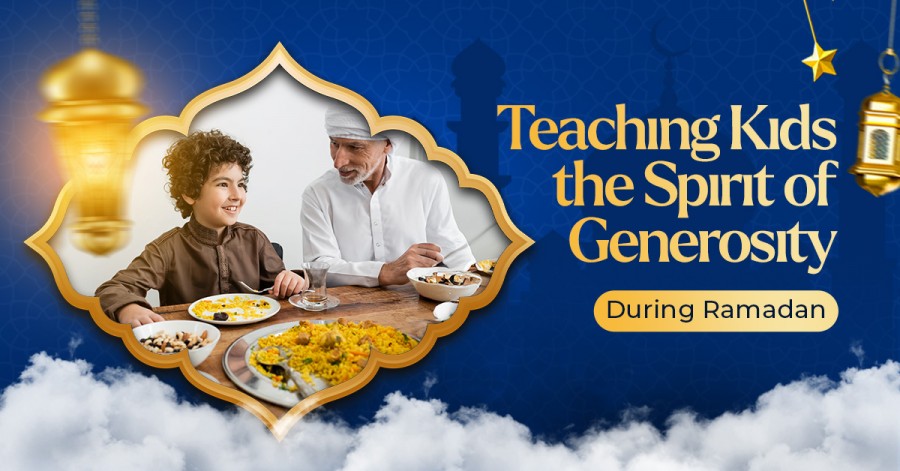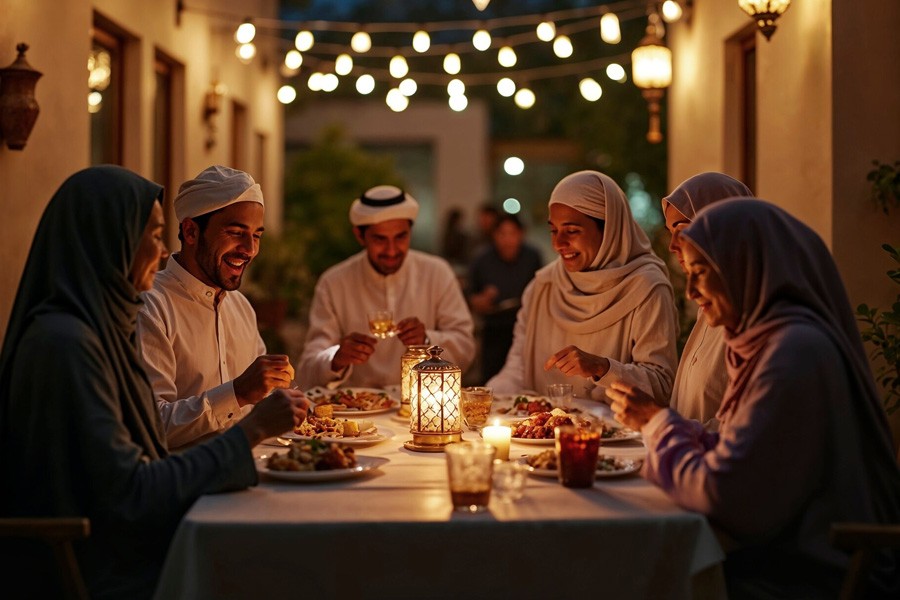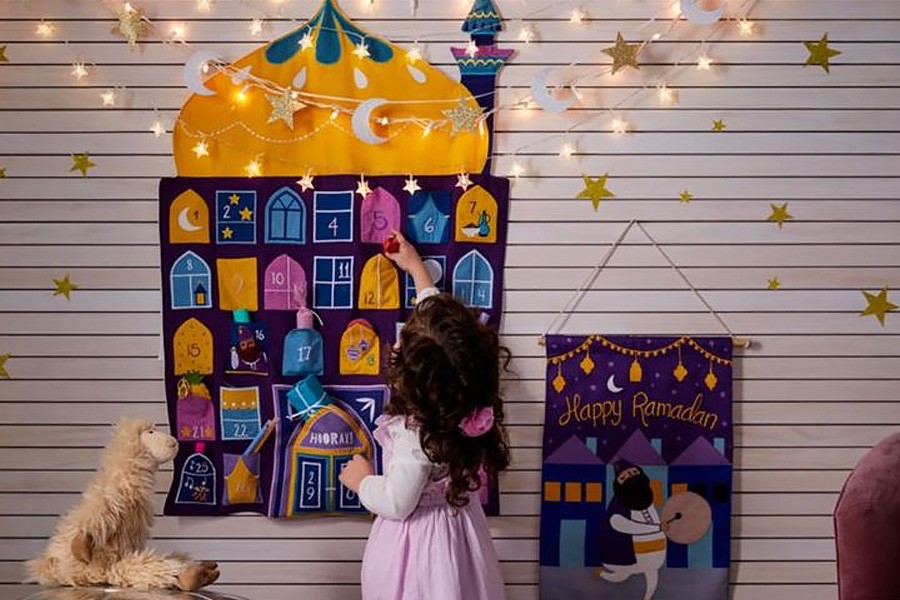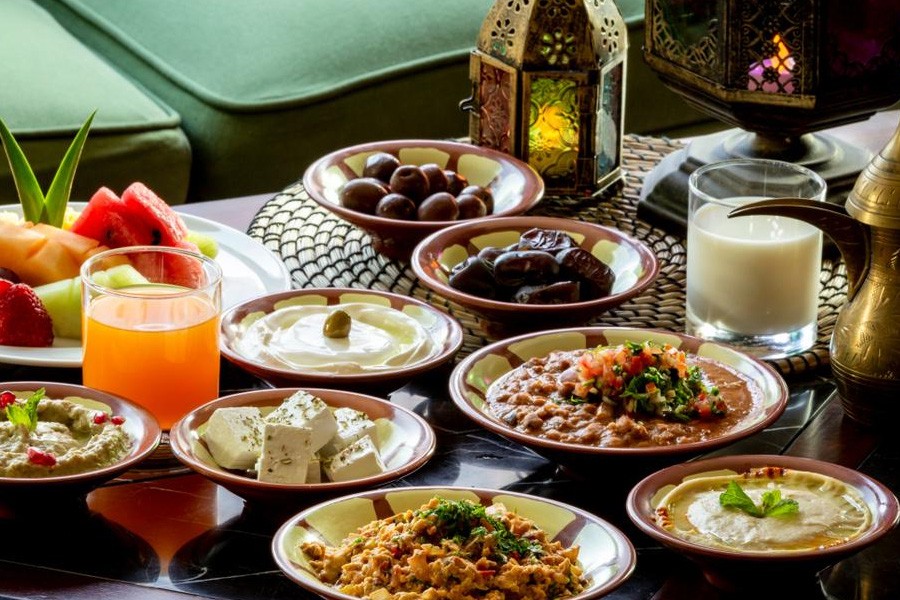Teaching Kids the Spirit of Generosity During Ramadan
Published 25 January 2026 at 10:24
Tickikids Blog Dubai > Parenting > Teaching Kids the Spirit of Generosity During Ramadan

Teaching kids generosity is more than just encouraging them to share—it’s about nurturing a deep-seated feeling of abundance and the joy of giving. True generosity comes from cherishing what one has, feeling grateful for it, and wanting to share that goodness with others. Ramadan is a perfect time for this lesson, as it naturally fosters an environment of gratitude, reflection, and community.
For little children, their earliest memories of Ramadan often revolve around the warmth of home, the joy of family traditions, and the sense of togetherness—decorating the house, setting the table for iftar, or listening to stories about kindness and faith. These experiences create an emotional foundation that helps them connect generosity with love, security, and gratitude. A child who grows up valuing the coziness of home and the blessings of family is more likely to become an adult who wants to extend that warmth to others—whether through charity, kindness, or community service.
That’s why teaching children generosity shouldn’t just be about acts of charity, but also about shaping them into people who naturally foster gratitude and kindness in their daily lives. It’s about growing into a personality that seeks to give, not out of obligation, but out of genuine empathy and a desire to spread goodness. By weaving these values into Ramadan traditions—through storytelling, hands-on charitable activities, and leading by example—parents and caregivers help children develop a lifelong habit of generosity, rooted in love and gratitude.
In this article TickiKids explores meaningful and practical ways to teach children generosity while immersing them in the beautiful customs of Ramadan.
Ramadan Mubarak!
Ramadan in Dubai

Image Credit: Freepik
As the crescent moon signals the beginning of the holy month, Muslims around the world, including in Dubai, come together in devotion, fasting, and reflection. With around 1.8 billion Muslims observing this sacred time, Ramadan is one of the most significant months in the Islamic calendar, fostering a spirit of unity, gratitude, and generosity.
In Dubai, Ramadan is a time when the city’s heart beats in unison with the spirit of the month—a reminder that faith, family, and generosity are the true pillars of a fulfilling life. A city known for its vibrant culture and warm hospitality, transforms into a mesmerising haven of faith, generosity, and celebration during Ramadan. As the crescent moon marks the beginning of the holy month, the city embraces the spiritual essence of Ramadan with a harmonious blend of tradition and modernity. From the glittering skyline adorned with Ramadan-themed lights to the peaceful calls to prayer echoing through the bustling metropolis, Dubai offers a unique and enriching experience for both residents and visitors.
During the day, the city slows down, allowing for quiet reflection, prayer, and fasting. Work hours are adjusted, and there is a palpable sense of unity as people come together in devotion. As the sun sets, Dubai awakens with a different kind of energy—iftar tents spring to life, families gather to break their fast with dates and traditional dishes, and the city’s famous souks and malls extend their hours, bustling with late-night shoppers and Ramadan festivities. The hospitality of the city shines through lavish iftar and suhoor spreads in hotels and restaurants, where people from all walks of life share in the spirit of generosity.
Beyond the grand iftar feasts, acts of charity and community service take center stage. Volunteers distribute food packs to workers and those in need, mosques organise Quran recitations and prayers, and the city’s philanthropic initiatives encourage residents to give back. Ramadan in Dubai is not just about abstaining from food and drink—it’s about fostering gratitude, strengthening family bonds, and embracing the values of kindness and selflessness!
- Cultural & Spiritual Activities: Mosques, especially the iconic Jumeirah Mosque, welcome worshippers for Taraweeh prayers, while Quran recitations fill the air. Dubai also hosts charity drives, embodying the values of zakat (charity) and giving back.
- Respect & Etiquette: While visitors are welcome, they should dress modestly and avoid eating, drinking, or smoking in public during fasting hours out of respect.
How Should Children Behave During Ramadan?
During Ramadan, Muslims fast from sunrise to sunset as a way to strengthen their faith and devotion. While children, along with pregnant women, the elderly, and those who are ill, are not required to fast, they can still participate in the spirit of the month in meaningful ways. Although fasting is only obligatory after puberty, younger children play an important role in honouring and respecting Ramadan by embracing its values and traditions.
Ramadan is a time for spiritual growth, and children can participate in many ways beyond fasting. By showing kindness, patience, and respect, they begin to understand the deeper meaning of the holy month while creating beautiful family memories.
Ramadan teaches discipline and self-restraint, and children can start learning these values by:
- Avoiding complaints about food or hunger in front of fasting family members
- Trying mini fasts, like skipping snacks between meals, to build understanding
- Practicing self-control by avoiding unnecessary arguments or tantrums
Even if they are too young for fasting, children can:
- Join family for prayers at home or at the mosque
- Listen to or read stories from the Quran to understand its teachings
- Try memorising short verses (ayahs) from the Quran
A great way for children to feel involved is by helping with iftar and suhoor:
- Setting the table for iftar (the meal to break the fast)
- Helping parents prepare simple foods, like arranging dates or pouring water
- Waking up early to join in suhoor, even if just for a small meal
Ramadan is about generosity and giving back, and children can:
- Share toys, books, or food with those in need
- Help pack charity boxes for the less fortunate
- Show kindness by helping parents, siblings, and neighbours
Even though they may not fast, children should:
- Respect fasting family members by not eating or drinking openly in front of them
- Use polite and kind words, avoiding arguments or rude behaviour
- Greet others with “Ramadan Mubarak” and learn about different cultures’ traditions
Creating a Festive Ramadan Atmosphere at Home with Kids

Image Credit: Pinterest
One of the best ways to make Ramadan special for children is by involving them in decorating the home. A beautifully decorated space not only enhances the spiritual ambiance of the month but also helps kids feel more connected to its traditions. By engaging in creative activities together, families can turn their homes into warm, inviting spaces that reflect the joy and significance of Ramadan and Eid al-Fitr.
- Start by illuminating your home with indoor lights, such as fairy lights or string lights in crescent moon and star shapes. Children will love helping to arrange them around windows, doorways, or even in their bedrooms to create a cozy, magical feel.
- Flower arrangements can also add a fresh and elegant touch—kids can help pick flowers or craft paper bouquets to place around the house.
- Another meaningful way to decorate is by revitalising your prayer space. Involving children in setting up a clean, peaceful corner for prayer with prayer mats, Quran stands, and soft cushions encourages them to appreciate the importance of worship during this sacred month. Adding decorative candles or lanterns can further enhance the atmosphere, creating a sense of serenity and reflection.
- Kids will also enjoy hanging up Ramadan lanterns, known as fanous, which are a traditional symbol of the month. These can be store-bought or homemade, allowing children to personalise their own lanterns with colours and designs. Similarly, decorating the front door with banners, wreaths, or Ramadan-themed signs helps set a welcoming tone for guests and neighbours.
As Eid al-Fitr approaches, families can add festive touches by inflating Eid Mubarak balloons and turning them into creative gifts by attaching small treats or notes of gratitude. This not only builds excitement for the celebration but also teaches children the joy of sharing.
Moonsighting and Prayer

Image Credit: Xinhua
One of the most exciting ways to welcome Ramadan with children is by observing the new moon together. This tradition, rooted in the Sunnah, allows kids to connect with both faith and nature in a hands-on way. Families can make the experience even more special using binoculars or a telescope to scan the night sky for the crescent moon. This simple yet meaningful activity not only builds anticipation for the holy month but also introduces children to the beauty of astronomy and its significance in Islamic tradition.
To make the occasion even more memorable, parents can encourage kids to invite their friends—Muslim and non-Muslim alike—for a small moonwatching gathering. It’s a wonderful opportunity for them to share the excitement of Ramadan with others while learning together. Once the crescent moon is spotted, families can recite the special dua for the beginning of Ramadan, reinforcing the importance of gratitude and reflection.
By making moonsighting a cherished family tradition, children not only develop an appreciation for the Islamic calendar but also experience the joy of welcoming Ramadan in a way that is both spiritual and educational.
Family Meals During Ramadan: Preparing, Eating, and Sharing Together

Image Credit: Depositphotos
One of the most cherished aspects of Ramadan is the daily iftar meal, where families gather to break their fast and share in the blessings of the day. For children, being involved in the preparation, serving, and sharing of meals helps them connect with the values of gratitude, kindness, and community.
- Involving kids in preparing iftar can be both fun and educational. Younger children can help by setting the table, washing fruits, or arranging dates and water—small but meaningful tasks that make them feel included. Older kids can assist in simple cooking steps, such as stirring soup, making fresh juice, or preparing traditional dishes under supervision. Teaching them family recipes passed down through generations also helps instil a sense of cultural pride and appreciation for the traditions that make Ramadan special.
- As the call to Maghrib prayer signals the time to break the fast, families sit together to enjoy the meal, starting with dates and water, followed by a variety of comforting dishes. The experience of eating together fosters warmth and connection, allowing children to appreciate the significance of sharing food with loved ones. It’s also a time for reflection, as families discuss their day, share stories, and encourage one another in acts of kindness and self-improvement.
- Beyond their own homes, Ramadan is a time to extend generosity to others. Visiting the Ramadan Markets in Dubai, attending cultural events, or simply inviting a neighbour or friend—regardless of faith—to share an iftar meal teaches children that generosity is not just about giving material things but about sharing love, time, and kindness.
- Families can also engage in charitable initiatives, such as preparing food packages for those in need or helping distribute meals at community iftar tents, reinforcing the idea that Ramadan is about caring for others.
By actively participating in these traditions, children absorb the true essence of Ramadan—that beyond fasting, it is a month of compassion, gratitude, and strengthening bonds with family and the wider community. These small yet profound lessons shape them into individuals who carry the spirit of generosity and empathy throughout their lives. Observing positive role models, children learn the significance of restraint, patience, and eagerness to do good—whether it’s through small acts of kindness, sharing with those in need, or simply appreciating their blessings. Ramadan becomes more than just a set of religious obligations; it turns into a time of connection, learning, and growth, helping young minds build a strong foundation of faith and compassion that will stay with them for a lifetime!